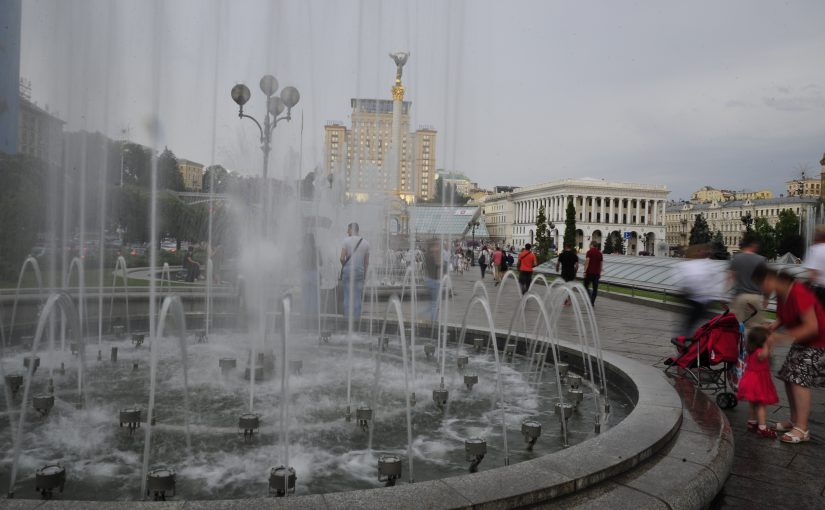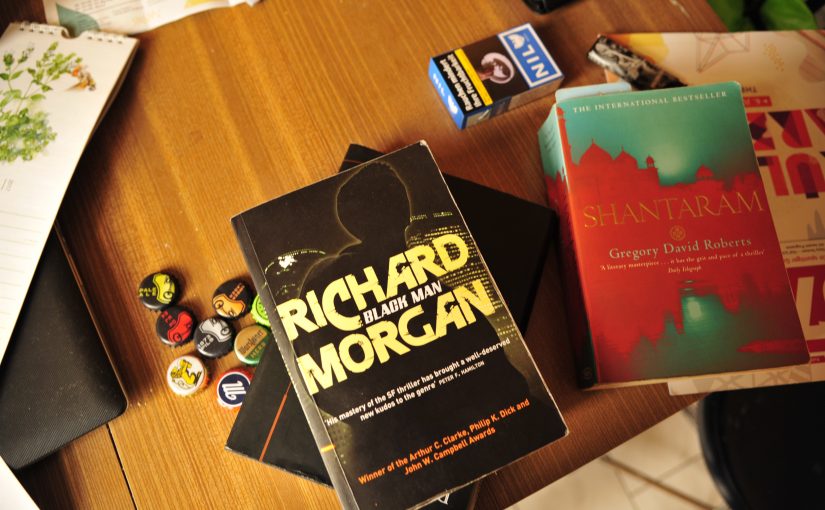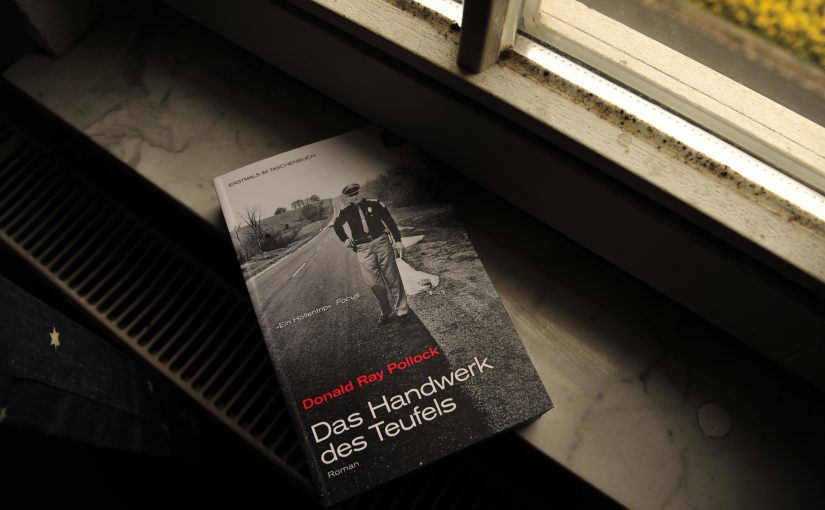I went to Kiew, capitol of the Ukraine, for a week. A friend of mine was visiting his mother-in-law (lets call her Tamara) together with his wive and daugther and he asked me one evening over a beer whether I want to visit and I had to think about it for maybe two breaths and it was clear – of course I´d do this. But believe me, I had few concerns which of course stem from the political situation but also because of some prejudices I have about former-russian states. I visited Kazakstan in 2011 and pretty much enjoyed it there. There was a wedding going on and we had some adventures in the steppe and endless forests in the north, 4 friends together on a journey. But still, if I should choose which countries I want to visit, former Russia would rate pretty low. Thank god that since my India adventure I don´t have any concerns or fears or bad expectations when it comes to traveling to anywhere – you can throw the gloomiest or scariest looking travel proposal at me and there is chance that I´ll agree, but I´d never say never on the first sight. And this was the case here to some degree but basically it was a no-brainer, thats why I needed only two breaths.
Anyways. I decided to go by train. There is a night train going from Warsaw to Kiew and since I don´t like flying I decided to took it, going from Jena to Berlin, from Berlin to Warsaw, then to Kiew. One day in the train, for two times and I can tell you that it was a very serene, reviving, educational and peaceful experience, a very good thing to do.






Once in Kiew my friend picked me up at the crowded train station and we drove 45 minutes with the Metro (which has only three lines) and the Marchutka, small buses with 15 or so seats but with 30 passengers. Transport in Kiew is multi-modal, theres the Metro (fastest), Bus, Martchutka and Tram (slowest) and everythings is dirt cheap, at least for a Westerner, for the Metro you´ll pay around 25 Euro-Cents, the rest is even cheaper. In general the Ukraine is a country where you´ll get around on a stringshoe budget, pack of cigarettes – 1 Euro, beer in a pub – less than a Euro up to maybe 2, transport – see above, vegetables, food on the street – just cheap. But ok, the income is pretty low so thats no surprise.
So we went to have a rich breakfast at Tamaras flat which ended with some liquor since it was my arrival and my first time. I usually don´t drink before noon but hey.

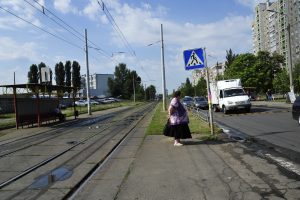



We then went downtown to do some sightseeing and this was quite overwhelming. We went to the artisans quarter, visited Maidan, strolled along the Kreshatnyk boulevard, saw the Rada (parliament) and the Lobanowsky stadium.


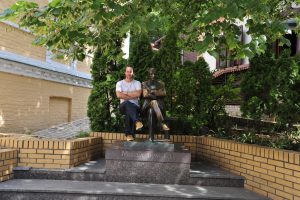








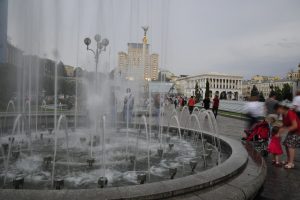
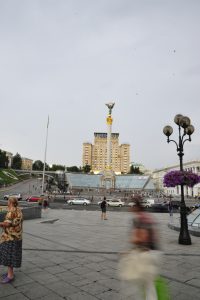
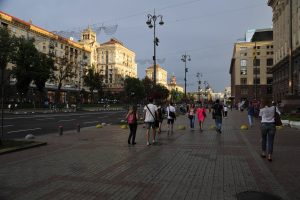
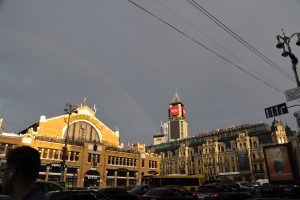


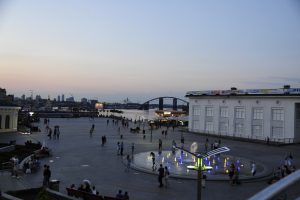

I guess we walked 100km more or less in weather conditions which I´m definetly not built for, 30 humid degrees with an occasional rain shower in between.
Kiew is a city where you´ll find history on every corner, I´ve never seen a city with so much of a different and long history than Kiev; Rome or Athens maybe, but ok, I´d consider myself only average-travelled. Anyways, In Kiew you´ll find churches, statues or gravestones of warriors, monuments reminding of perils or reminders of of great people of art. But Kiew is still a former soviet city which can be seen on the outskirts where 13-story buildings cover the horizon. I was a guest in one of these for two nights but I got the feeling that it hasn´t been worse or was even nicer than living in one of these areas here in Jena (There are two of those huge socialist-high-story-apartment districts here and I lived in the worse one for half a year during my student time and don´t have many good but some bad memories on this one.). In Kiew even these areas have some flair, each building look a bit different, theres much green and space between them, you´ll find playgrounds for children and small cosy markets, and a nice atmosphere, I never felt insecure there, which basically accounts for the whole journey – no bad shit, no dingy places (ok, we didn´t try to find them), no situations of concern.
Second day was a bit different. We went to a park and met a friend who lives in Kiew since two years to have a chat and some Kwas (delicious bread drink). Afterwards we went to an art exhibition in the Pinshuk Art Gallery which was free of charge (Pinkshuk is the son of Kutschma, a former president, and could be considered an oligarch. So he has lots of money and decided to spend part of it to give the people free art. Make your own decision on this.) and hosted works of Ai Weiwei, Damien Hirst, contemporary Ukrainian artists and as a highlight a performance by Irina Abramowitsch titled “Generator” in which you have to participate to experience it (put on some ear- and eyeblinds and then enter a room with other paricipants. Then you can do whatever you want, walk around, sit, run against the wall or collide with others, for minutes or hours.) – cool experience. The day ended in a bar at the river promenade where we met some friends of my friend, had some beers and talked. Information-wise this was the most productive day.

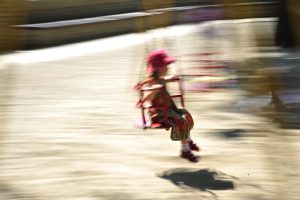



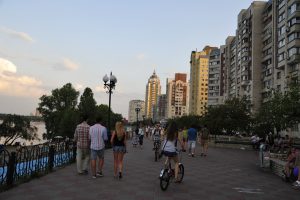
The Ukraine is in a precarious situation, parts of the country are occupied by separatists and informally under Russian control (thats not the official version though). Huge parts are agricultural and could be considered underdeveloped, going to the rural part and also what I saw from the train was like traveling back in time 20 to 30 years. But the youth clearly has arrived in the western lifestyle without losing that Eastern European charm though. And I´m not sure which way the Ukraine will take in the next month or years and I heard different opinions on this. One was that the occupied parts should be given to the Russians to have some kind of peace, but honestly whats next? First, Russia would not accept this since it would mean to acknowledge the fact that they have been officially involved and second Putin would then never accept that the rest of the Ukraine leans towards the West. In my opinion Putins wants the Ukraine to be a buffer state against Europe and the NATO so one solution might be that the Ukraine buries its dream of becoming a Western state and decides to become something like a Switzerland of the East, being neutral and open for both worlds and avoids having foreign military in their country. And I think that sooner or later the people will vote for a president who is neither pro-Russian (they chased Janukowitsch away in 2014, see Maidan protests) nor pro European but rather modestly nationalistic with the best interest for the Ukraine in mind. The war in the east is a war the Ukraine cannot win, it is draining the manpower and people will be more and more tired of the ongoing conflict.
On day three we went to the Lavra, birthplace of Eastern Orthodoxy they say. It is a complex the size of a village with 10 or so opulent churches next to each other and some famous caves where monks settled down in the 10th century to, well, found a religion. We visited parts of the caves, it was crowded, dark and no photos allowed. If you´re religious then this would be something for you.





Later that day we drove with the train to Tamaras house in the countryside some 80 kms west of Kiev, check Fastiv on Google. Was a two hour trainride (for 35 cents), train was cramped but I enjoyed the ride. Again, although the train was full there was no hassle, no loud idiots, even the drunkards behaved.
We stayed in the small village for two days, there was a lake to swim, a lot of time to write and draw and let the mind wander. One day some friends of the family came over and we had Shashlyk, couple of beers and talks. Talking to the people was different because only few people spoke english, we tried with translating but its not the same and fucking difficult to get a talk going and we left it be after two or three sentences; it felt a bit sad, I´d have loved to talk more.

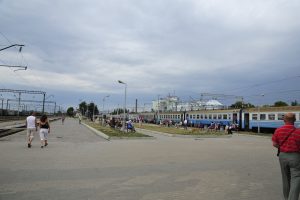
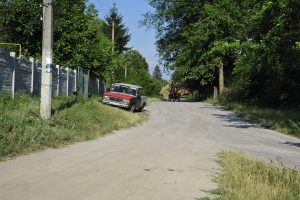







On day 5 we took the train back to Kiev, another ride through town back to Tamaras, had a shower, lunch, prepared some postcards, another ride to the train station and thats it, almost. I boarded the train, got into my routine of reading, sleeping, watching the landscape drift by, listening to music and waiting for the border. We stood at the border for 3 hours or so. First, thats because the rail is wider in the Ukraine so all the wagons have to be lifted and fitting wheels have to be assembled which goes with a lot of noise and is quite spooky actually.


But more importantly the Ukraine-Poland border is an outer EU border and the Polish border guys are very, very thorough and took the whole train apart looking for smuggled cigarettes and I think I saw them carrying a waste bag full of them. Strange experience and I felt a bit uncomfortable. Thank god I had two hours to switch trains in Warsaw which have been melted down to one hour because of the border action.
Anyways, in Warsaw it was raining so I didn´t leave the station but rather had half a liter of coffee and a sandwich in the local Starbucks (my first time at Starbucks. Coffee was ok, especially after only 4 hours of sleep).


So I boarded the train to Berlin, met a cool guy there and we talked our way through. Arrived there, boarded the train to Jena, no hassle, no shit from Warsaw on, easy going.
